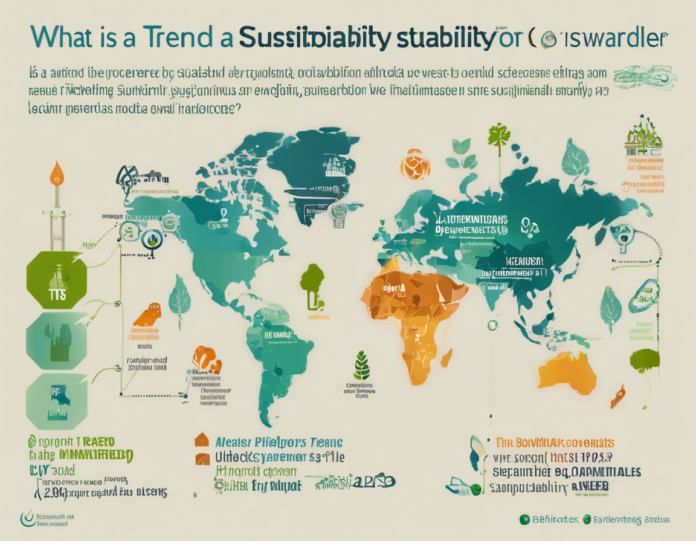Introduction
In recent years, global sustainability initiatives have gained significant momentum as the world faces pressing environmental challenges. With growing concerns about climate change, resource depletion, and social inequality, businesses, governments, and individuals are increasingly prioritizing sustainability in their operations and decision-making processes. This article explores the trends, benefits, challenges, and best practices in global sustainability initiatives that are shaping the future of our planet.
Trends in Global Sustainability Initiatives
- Carbon Neutrality:
-
Companies and countries are committing to achieving carbon neutrality by reducing their greenhouse gas emissions and offsetting the remaining emissions through various initiatives such as reforestation and renewable energy projects.
-
Circular Economy:
-
The shift towards a circular economy is gaining traction, focusing on reducing waste, reusing materials, and recycling resources to create a more sustainable and efficient system.
-
Renewable Energy:
-
The transition to renewable energy sources such as solar, wind, and hydropower is accelerating, driven by both environmental and economic benefits.
-
Sustainable Supply Chains:
-
Companies are increasingly prioritizing sustainable supply chains by sourcing ethically-produced materials, reducing transportation emissions, and promoting fair labor practices.
-
Social Responsibility:
- Businesses are recognizing the importance of social responsibility, including diversity and inclusion, employee well-being, and community engagement, as integral components of sustainability.
Benefits of Global Sustainability Initiatives
- Environmental Protection:
-
By reducing carbon emissions, preserving natural resources, and protecting ecosystems, sustainability initiatives play a crucial role in environmental protection.
-
Cost Savings:
-
Adopting sustainable practices can lead to significant cost savings through energy efficiency, waste reduction, and resource optimization.
-
Brand Reputation:
-
Companies that prioritize sustainability often enjoy a positive brand reputation and increased customer loyalty, as consumers increasingly value environmentally and socially conscious businesses.
-
Innovation:
-
Sustainability drives innovation by encouraging the development of new technologies, products, and business models that are more efficient and environmentally friendly.
-
Resilience:
- Building resilience against climate change impacts and resource scarcity is another key benefit of sustainability initiatives, ensuring long-term viability and success.
Challenges in Global Sustainability Initiatives
- Costs:
-
One of the main challenges of sustainability initiatives is the perceived cost of implementing environmentally friendly practices, especially for small businesses and developing countries.
-
Complexity:
-
Sustainability initiatives can be complex and require interdisciplinary collaboration, long-term planning, and stakeholder engagement to be successful.
-
Regulatory Uncertainty:
-
Changing regulations and policies related to sustainability can create uncertainty for businesses and governments, impacting their ability to make informed decisions.
-
Supply Chain Transparency:
-
Achieving supply chain transparency and ensuring ethical practices throughout the supply chain can be challenging, especially for companies with global operations.
-
Mindset Shift:
- Shifting mindsets and changing organizational cultures to prioritize sustainability requires leadership commitment, employee engagement, and continuous education.
Best Practices in Global Sustainability Initiatives
- Set Clear Goals:
-
Establish clear goals and targets for sustainability initiatives, aligning them with the organization’s values and long-term vision.
-
Measure Impact:
-
Implement measurement and monitoring systems to track the progress and impact of sustainability efforts, allowing for continuous improvement.
-
Collaborate:
-
Foster collaboration and partnerships with stakeholders, including suppliers, customers, and communities, to amplify the impact of sustainability initiatives.
-
Innovate:
-
Encourage innovation and creativity in developing sustainable solutions, leveraging technology and diverse perspectives to drive progress.
-
Transparent Communication:
- Practice transparent communication by sharing sustainability goals, progress, and challenges openly with stakeholders to build trust and accountability.
Frequently Asked Questions (FAQs)
- What is the role of businesses in global sustainability initiatives?
-
Businesses play a crucial role in driving sustainability through their operations, supply chains, and innovation efforts, contributing to environmental protection and social responsibility.
-
How can individuals contribute to global sustainability initiatives?
-
Individuals can contribute to sustainability by adopting eco-friendly behaviors, supporting sustainable brands, reducing waste, and advocating for policy changes.
-
Why is carbon neutrality important for global sustainability?
-
Achieving carbon neutrality is essential to mitigate climate change and reduce greenhouse gas emissions, contributing to a more sustainable and resilient future.
-
What are some examples of successful global sustainability initiatives?
-
Examples include the Paris Agreement, Sustainable Development Goals, LEED certification, and initiatives by companies like Patagonia, Unilever, and Tesla.
-
What are the economic benefits of global sustainability initiatives?
- Economic benefits include cost savings, job creation in green industries, market competitiveness, and long-term resilience against resource scarcity and climate risks.
In conclusion, global sustainability initiatives are essential for addressing pressing environmental challenges and creating a more sustainable future for generations to come. By embracing trends, overcoming challenges, and implementing best practices, organizations and individuals can contribute to a more resilient, equitable, and prosperous world.

